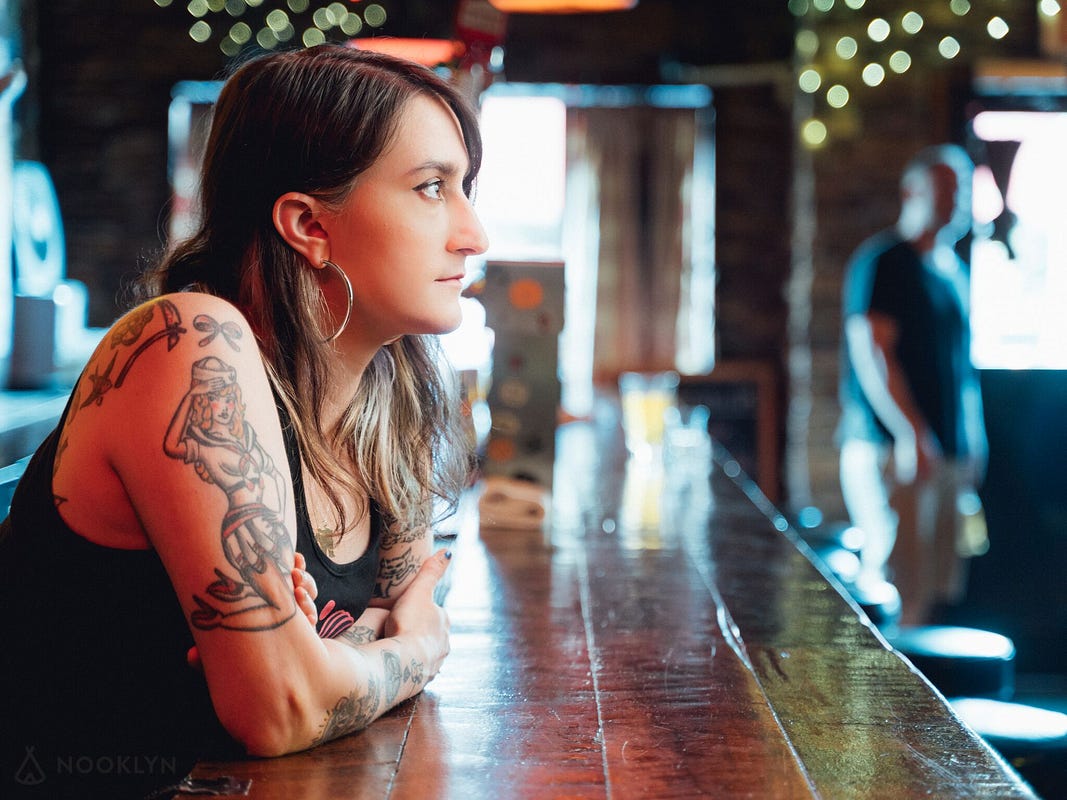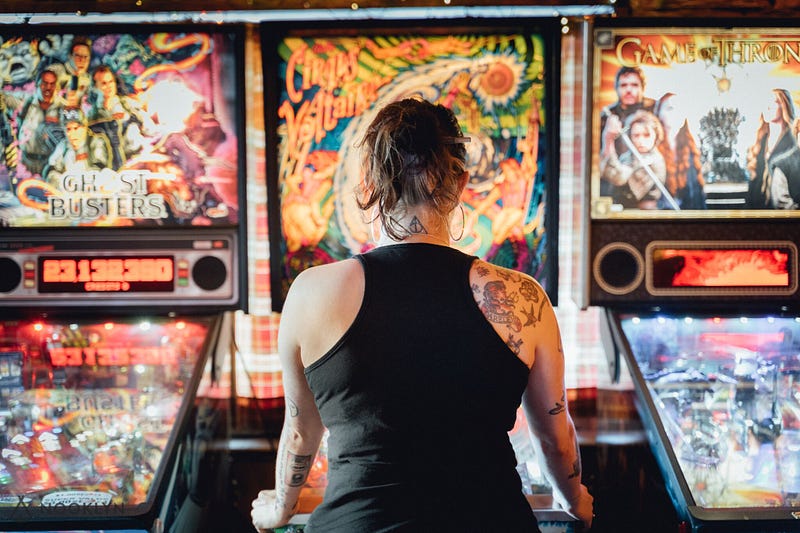If you’ve ever wondered if the walls could talk, imagine what the bar would say. Then ask the human being behind it. Bartenders see everything. They can tell you all about a neighborhood, its people, share gossip, engage in a variety of conversations — all while making your drink. They see some of the best, the worst, and the sloppiest. Try chatting up your bartender the next time they’re pouring your beer: you never know what you might learn.
Today’s featured bartender is Kaite, who works at Buttermilk in Park Slope. Equal parts April Ludgate and Gilbert and Sullivan (and a dash of tequila monster), she’s been bartending there over four years. You can catch her behind the bar most Wednesday and Thursday nights if you want to pop in for a beer, a shot, and maybe even a game of pool. Buttermilk offers activities from bar sports to a photo booth (FYI, the place gets pin-drop quiet and focused when Jeopardy comes on).
Nooklyn Stories: What kind of people come here?
Kaite: I would say mostly…what’s the one before millennial? Gen X? Gen Y? But this time of year [end of summer] there’s more millennials. They come back from college and stay with their parents who live in the houses in Park Slope. They’re originally from the neighborhood, and they go off to college, and then they come back and…this is a cheap dive bar. And it’s got things [she gestures to pool table, arcade games, etc.].
NS: Well I hope they tip.
K: They don’t. Overwhelmingly, they do not tip.
NS: Then how are the Gen Xers with tipping?
K: Those are great. Fantastic. It’s a lot of corporate people that want to have a cold cheap beer. Like they don’t necessarily need a ten dollar twelve ounce pour of some…thing.

NS: What other neighborhoods do you currently work in? Or have you worked in?
K: This is my only job at the moment. Until recently I worked in Gowanus at The Bell House, which is mostly a venue and not really a bar. I’ve worked in Williamsburg, Carroll Gardens, East Village, and West Village also.
NS: Which neighborhood has been best for you?
K: Park Slope. I prefer Park Slope.
NS: Really? Why not Manhattan? Isn’t that a younger and busier crowd?
K: The West Village is actually a little more bro-ey. I mean, it’s been over ten years at this point, so I couldn’t actually tell you that anymore. The East Village was a lot of vodka sodas — girls watching their figures, so they’ll have 14 vodka sodas and 4 slices of pizza and cry in a cab back to the PATH train.

NS: What neighborhood do you live in?
K: I live in Park Slope.
NS: How did you find your place?
K: My mom owns it. It’s a one family home turned into three apartments. One of her tenants was moving out while my rent in Ditmas was going up, and could walk to work if I moved back here, so nepotism won and I got an apartment. Which is…fine. It’s weird living on my old block again.

NS: If there’s any insight that bartending has afforded you on the human condition, say, in your years of getting them less inhibited, is there any bit of wisdom that you would pass on?
K: Should I not say “Humans are trash?” Of the things that I’ve learned about people from bartending, it doesn’t matter where you are or how much money you have, everyone can vomit. Everyone can get to a point where…that’s just their time to throw up. Even if someone has lost their wallet or they’re just broke, everyone will drink a cheap beer and a whiskey. Generally, people are good. They just want to be nice and have a good time. People like when you want them to have a good time. A lot of people need a babysitter, either for their kids or themselves. Oh, and don’t talk to people you don’t know.
NS: Don’t talk to people you don’t know? Isn’t that the point of bars before dating apps?
K: Yeah…don’t encroach on people’s conversations.
NS: So how are you supposed to meet people?
K: Delicately. If you see two women at the bar, don’t walk up between them in the middle of their sentence and ask them how their night is going. Leave them alone.
NS: So how should they begin conversations at bars, then? Can you talk about what doesn’t work?
K: “What book are you reading?” They’re reading. Leave them alone. If they show you or tell you what they’re reading, and then turn back, don’t proceed to ask them questions. “Can I buy you a drink” really only works for people that you don’t want to buy a drink for in the first place. Conversations and friendships happen organically. If someone wants to start talking to you, or vice versa, you throw some chum in the water — if they bite, you’ll know, and if they don’t, you’ll know.

